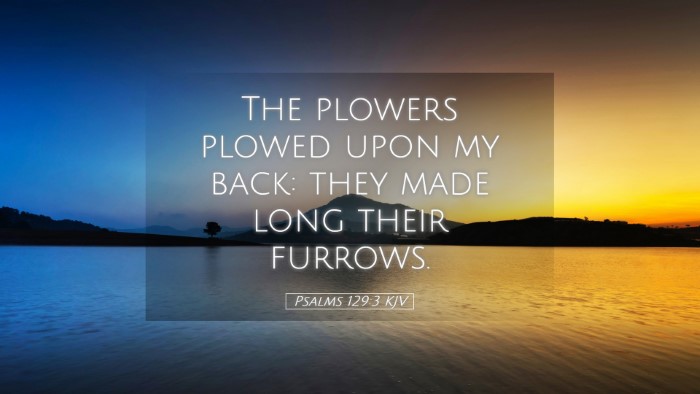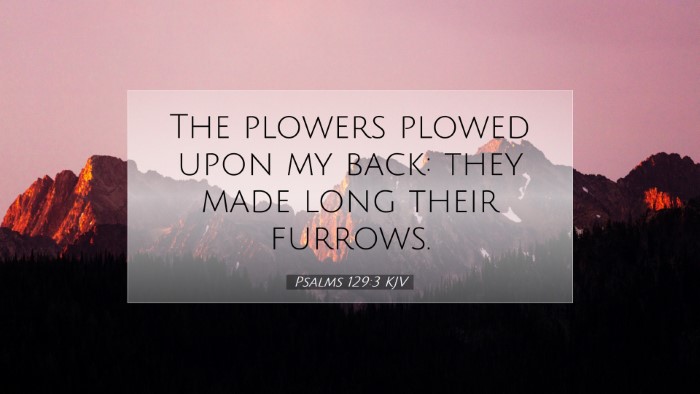Commentary on Psalms 129:3
Bible Verse: "The plowers plowed upon my back: they made long their furrows."
Introduction
This verse from Psalms 129 expresses deep anguish and suffering experienced by the psalmist, a depiction of the oppression faced by Israel. The imagery of plowing illustrates the brutal treatment suffered by the people of God. The verse speaks volumes not only about the historical context but also about the spiritual significance of suffering and redemption. The following insights from esteemed public domain commentaries provide rich perspectives on this verse.
Historical Context
The psalmist, likely speaking on behalf of the nation of Israel, reflects on the abuse and trials they have endured throughout their history, particularly during times of exile and oppression. Scholars suggest that this imagery draws from agrarian society, where "plowers" represent their enemies who inflict harsh treatment.
Matthew Henry's Insight
Oppression and Suffering: Matthew Henry notes that the "plowers" refer to those who have historically oppressed and tortured Israel. The "furrows" symbolize the deep scars inflicted by these adversaries. He emphasizes that such oppression serves to strengthen the resolve of the faithful, reinforcing their reliance on God.
Divine Perspective: Henry also highlights that despite the severity of their suffering, God observes and ultimately protects His people. The imagery also serves as a reminder that, through suffering, believers may emerge refined, much like metal purified by fire.
Albert Barnes' Commentary
Metaphor of Plowing: Albert Barnes elucidates the metaphor of plowing as indicative of systematic oppression. He remarks on the pain and adversity that Israel has faced, comparing it to botanical furrows made in soil. This not only conveys physical suffering but also the extensive and prolonged nature of the affliction.
Resistance and Strength: Barnes points out that the psalmist acknowledges this pain as a precursor to redemption. The mention of "making long their furrows" speaks to the enduring struggle, but it also highlights the resilience of the oppressed people, who, despite their wounds, maintain their identity as God's chosen ones.
Adam Clarke's Perspective
Symbolism of Labor: Adam Clarke discusses the societal implications of the plowing metaphor, relating it to the labor and tribulations endured by God’s people. He suggests that the "plowers" represent not just physical enemies but spiritual adversaries that seek to undermine faith.
Hope Amid Suffering: Clarke emphasizes the psalmist’s hope in God’s ultimate justice. While acknowledging the brutal treatment likened to furrows on the back, he assures that divine intervention is certain. The suffering of the innocent will not be overlooked by the Almighty.
Theological Reflection
This verse invites deep theological reflection regarding suffering, justice, and divine providence. It resonates particularly with pastoral care, as it offers solace to individuals experiencing trials, reminding them of God's enduring presence amid suffering.
The Nature of Suffering: The psalmist's experience mirrors the Christian understanding of suffering as a pathway to spiritual growth and deeper reliance on God. The metaphor of plowing can symbolize the transformative power of trials in shaping character and faith.
The Hope of Redemption: Just as the plowing leads to the potential for new growth in agriculture, suffering, as noted by the commentators, can precede spiritual renewal. The text assures believers that God will vindicate His people and deliver them from their oppressors. This theme echoes throughout scripture, reaffirming the belief in God’s redemptive plan.
Practical Applications
For pastors, students, and scholars, this verse serves as a poignant reminder of the reality of suffering within the Christian journey. The insights provided by Matthew Henry, Albert Barnes, and Adam Clarke highlight the importance of understanding the context of suffering in both ancient and contemporary settings.
- Empathy in Ministry: Understanding the depth of suffering as depicted in this verse can foster empathy in pastoral care, allowing ministers to offer hope and support to those in distress.
- Encouragement through Scriptures: Sharing this psalm, along with its interpretations, can encourage individuals facing trials, reminding them that their struggles are recognized by God and may lead to redemption.
- Theological Education: Engaging with this commentary enriches theological education, encouraging deeper exploration of how the Old Testament’s themes of suffering and divine faithfulness resonate today.
Conclusion
Psalms 129:3 encapsulates the profound experience of suffering as part of the human and spiritual journey. The insights from esteemed commentaries provide a multifaceted understanding that can speak to both the heart and mind of those engaged in ministry and scholarship. It is a compelling call to recognize the struggles that shape faith while anchoring hope in God’s ultimate plan for justice and redemption.


